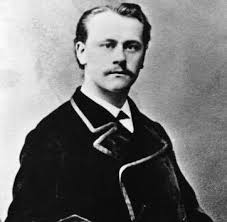

Sumi Jo
Henri Duparc
Saturdee Opry Links Overture!
Donizetti: "Gemmy di Vergy"
https://www.youtube.com/watch?v=pZWJIz5TEE4
1.
Today’s Opry Links
opens/open with. . .Joan Baez. Eh? Huh? Yes, Joanie, you see, loves Jussi.
Here she visits the Jussi Bjorling Museum in Sweden and talks about her love for
the great man's voice. (Beats Dylan!)
http://www.youtube.com/watch?v=vmAH-MFV48c
2.
And
here is Joan's favorite Bjorling recording, the moody and moving Swedish song, "Tonerna."
Translation below.
http://www.youtube.com/watch?v=U8ZrFzMClzo
Translation:
Tonerna
Text: Erik Gustaf Geijer
Musik: Carl Sjöberg
Tonerna:
“Tanke, vars strider blott natten ser
Toner, hos eder om vila den ber
Hjärta, som lider
som lider av dagens gny
Toner till eder
Till er vill det fly”
This short poem is impossible to translate to
English. Here’s the translation from the liner notes:
“Thoughts, whose
struggles only the night knows.
Music, they ask you for peace.
The heart that suffers.
That suffers from life’s commotion.
Music, to you - to you it wants to escape.”
3.
Today's Saturdee Opry Links Theme is "arias of delicacy and poignancy."
What's that you say? You can throw a brick at an opera and hit an "aria of
delicacy and poignancy?" Quite so. so I threw a few bricks. The first one
hit: “Depuis Le Jour,” or “Since the Day,” from “Louise,” by Charpentier. Mirella
Freni, soprano.
http://www.youtube.com/watch?v=3FkV16CpxNQ
Translation, setting:
http://www.aria-database.com/search.php?individualAria=1203
And although I don't think anyone can touch
Mirella Freni's delicacy in this aria, for those who prefer to watch the
singer in action, there's nothing wrong with the rich, creamy voice of Renee
Fleming:
http://www.youtube.com/watch?v=_d_8ovQHbF4
4.
The incredibly tender and touching "Marietta's Lied," from
the fine 20th century opera, "Die Tote Stadt," by
Eric Wolfgang Korngold. As lovely as lovely can be. Anne Sofie Von Otter, soprano.
https://www.youtube.com/watch?v=UCKPkGz3jRU
Setting: Paul's room devoted to his dead wife Marie, Brussels, late 19th
century
Synopsis: After Marietta and Paul meet for the first time, she sings an
intensely sad song about lost love for him.
Night sinks into the grove. . .
Translation, setting:
http://www.aria-database.com/search.php?individualAria=844
5.
One
of many extraordinary songs by by the tragedy-beset composer, Henri Duparc.
From Wikipedia: Duparc is best known for his 17 mélodies ("art songs"), with
texts by poets such as Baudelaire, Gautier, Leconte de Lisle and Goethe. A
mental illness, diagnosed at the time as "neurasthenia", caused him abruptly
to cease composing at age 37, in 1885. He devoted himself to his family and
his other passions, drawing and painting. But increasing vision loss after
the turn of the century eventually led to total blindness. He destroyed most
of his music, leaving fewer than 40 works to posterity.
Here is "Chanson Triste." "Sad Song," and
well it should have been. Sung by the fairly incomparable Sumi Jo.
http://www.youtube.com/watch?v=O_vEnW-yank
About Duparc:
http://en.wikipedia.org/wiki/Henri_Duparc_%28composer%29
6.
The haunting---some would say devastating---"O
Patria Mia" from Verdi's "Aida," with Leontyne Price. A
princess laments that she will never see her homeland again. Live on stage at the Met, with
English subtitles.
Summary: Aida, the Ethiopian princess captured by the
Egyptians, fell in love with her captor, Radames, who was unaware of her
royal lineage. Sadly, Radames is engaged to marry the Egyptian princess,
Amneris. While Aida waits outside of the temple to meet with Radames, her
father, King Amonasro (who was captured in battle, but whose true identity
remains unknown), asks her to learn the position of the Egyptian troops.
Feeling nostalgic and missing her homeland, she agrees to her father's
request, despite the precarious position she now finds herself. After the
conversation with her father, Aida sings "O Patria Mia" ("O, my country. .
.").
http://www.youtube.com/watch?v=IaV6sqFUTQ4
Translation:
http://www.aria-database.com/translations/aida03_patria.txt
7.
Here is the deceptively "pretty" "Ach, Ich Fuhl's," ("I feel it") from "The Magic Flute." Kiri te Kanawa, soprano.
The opera writer, William R. Braun, has devoted an entire article to
explaining how and why this aria is so deeply extraordinary. And you thought it was
just a nice tune, eh? (Me, too!)
http://www.operanews.com/Opera_News_Magazine/2013/12/Features/Measures_of_Greatness.html
EXCERPT: In 1975, "Ach, ich fühl's" was paid an extraordinary
tribute. It came not from a musician but from Swedish film director Ingmar
Bergman. In Bergman's loving and musically responsive film of the opera,
"Ach ich fühl's" is presented in a single take from a single camera. No
video director of the opera today would acknowledge that the music was
interesting on its own, would hear that every change of harmony except one
is a surprise, or would understand that the piece represents both the
culmination of Western musical thought up to its own moment in history and
the course it would take in the next century. Nowadays, the aria would have
eight or ten changes of camera angle, each of them swooping and gliding. But
everyone agrees that Bergman knew something about making a film, and let it
be noted that he had an ear for music as well.
http://www.youtube.com/watch?v=jcbAQqShJ-g
Translation:
http://www.aria-database.com/translations/mflute17_ach.txt
8.
True, there is no such thing other than a Puccini aria that is not gorgeous.
Yet
"Doretta's Beautiful Dream," from "La Rondine" ("The
Swallow"), is other-worldly for its subtlety and allure. Renee Fleming,
soprano.
http://www.youtube.com/watch?v=mNt3iiqjLww
Translation:
http://www.recmusic.org/lieder/get_text.html?TextId=54958
Setting: Act I
Paris, the 1920s. The wealthy Rambaldo and his mistress,
Magda, are entertaining theatrical and literary friends. Prunier, a poet and
the lover of Magda’s maid, Lisette, declares that romantic love is back in
fashion. No one except Magda takes him seriously. When Prunier sings a
ballad he has written about a girl who rejects the love of a king, Magda
sits at the piano and finishes the song, making up a second verse that tells
how the girl falls in love with a student (“Chi il bel sogno di Doretta”).
http://metoperafamily.org/metopera/history/stories/synopsis.aspx?customid=703
9.
Yes, you've heard it in the movie, "Diva," but don't hold that against it.
These are the exquisitely floating lines of
"Ebben! Ne andrò
lontana"---"Ah, well, then---I shall go far away," from "La Wally," by
Alfredo Catalani. Just to underline the proceedings, the Maria Callas
recording.
About:
http://en.wikipedia.org/wiki/La_Wally
Translation:
http://www.aria-database.com/translations/wally03_ebben.txt
http://www.youtube.com/watch?v=-pkNpl-tZIw
Setting: Wally is secretly in love with a man
from another town named Giuseppe Hagenbach who is also her father
Stromminger’s mortal enemy!(Well maybe not mortal enemy but you get it…) So
on Stromminger’s 70th birthday, another man named Vincenzo Gellner confides
to Stromminger about his suspicions of Wally and Hagenbach.
Putting two and two together, Stromminger
realizes that Gellner is in love with his daughter and he decides that she
would be better off with Gellner. Wally comes in and he tells her that she
either marries his silver fox friend within a month or be banished from his
household forever. (This scene could be heavily strengthened if the artist
singing Stromminger has a huge cape.) Wally replies that she would rather
take her chances in the Alpine snow then drags Walter away into the freezing
snow with her. This is when she sings the aria “Ebben, ne Andro Lontana?”
and departs for the mountains.
http://operateen.wordpress.com/2013/01/01/uncovering-la-wally-act-1/
For those who prefer to see the aria sung
live, here’s Anna Netrebko:
http://www.youtube.com/watch?v=YrFx3Bie7Dk
10.
Started today
with Jussi Bjorling, so will end with him. You can't go out on a better
note, ever.
"En Svane" ("The Swan"), by Grieg.
My swan, my silent one,
With white plumage,
Your delightful songs,
No trill betrayed.
https://www.youtube.com/watch?v=gzSANgxzIPQ
Translation:
http://www.recmusic.org/lieder/get_text.html?TextId=43666



